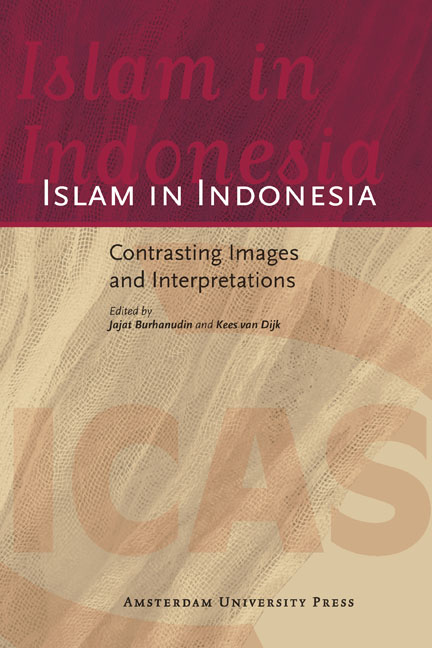Book contents
- Frontmatter
- Contents
- Introduction
- 1 Comparing Different streams of Islam: Wrestling with Words and Definitions
- 2 Defining Indonesian Islam: An Examination of the Construction of the National Islamic Identity of Traditionalist and Modernist Muslims
- 3 Indonesia in the Global Scheme of Islamic Things: Sustaining the Virtuous Circle of Education, Associations and Democracy
- 4 Distinguishing Indonesian Islam: Some Lessons to Learn
- 5 Islam, State and Society in Democratising Indonesia: A Historical Reflection
- 6 The Politics of Piety in the Pondok Pesantren Khusus Waria Al-Fattah Senin-Kamis Yogyakarta: Negotiating the Islamic Religious Embodiment
- 7 The Indonesian Muslim Feminist Reinterpretation of Inheritance
- 8 Managing Familial Issues: Unique Features of Legal Reform in Indonesia
- 9 A new Generation of Feminists within Traditional Islam: An Indonesian Exception
- 10 Religious Pluralism and Contested Religious Authority in Contemporary Indonesian Islam: A. Mustofa Bisri and Emha Ainun Nadjib
- 11 Islam and Humanitarian Affairs: The Middle Class and New Patterns of Social Activism
- 12 Dakwah radio in Surakarta: A Contest for Islamic Identity
- 13 Muslim Fundamentalism in Educational Institutions: A Case Study of Rohani Islam in High Schools in Cirebon
- 14 Majlis Tafsir Al-Qur’an and its Struggle for Islamic Reformism
- Glossary
- About the Editors and Contributors
- Bibliography
- Index
- Monographs
10 - Religious Pluralism and Contested Religious Authority in Contemporary Indonesian Islam: A. Mustofa Bisri and Emha Ainun Nadjib
Published online by Cambridge University Press: 09 January 2021
- Frontmatter
- Contents
- Introduction
- 1 Comparing Different streams of Islam: Wrestling with Words and Definitions
- 2 Defining Indonesian Islam: An Examination of the Construction of the National Islamic Identity of Traditionalist and Modernist Muslims
- 3 Indonesia in the Global Scheme of Islamic Things: Sustaining the Virtuous Circle of Education, Associations and Democracy
- 4 Distinguishing Indonesian Islam: Some Lessons to Learn
- 5 Islam, State and Society in Democratising Indonesia: A Historical Reflection
- 6 The Politics of Piety in the Pondok Pesantren Khusus Waria Al-Fattah Senin-Kamis Yogyakarta: Negotiating the Islamic Religious Embodiment
- 7 The Indonesian Muslim Feminist Reinterpretation of Inheritance
- 8 Managing Familial Issues: Unique Features of Legal Reform in Indonesia
- 9 A new Generation of Feminists within Traditional Islam: An Indonesian Exception
- 10 Religious Pluralism and Contested Religious Authority in Contemporary Indonesian Islam: A. Mustofa Bisri and Emha Ainun Nadjib
- 11 Islam and Humanitarian Affairs: The Middle Class and New Patterns of Social Activism
- 12 Dakwah radio in Surakarta: A Contest for Islamic Identity
- 13 Muslim Fundamentalism in Educational Institutions: A Case Study of Rohani Islam in High Schools in Cirebon
- 14 Majlis Tafsir Al-Qur’an and its Struggle for Islamic Reformism
- Glossary
- About the Editors and Contributors
- Bibliography
- Index
- Monographs
Summary
Islam in Indonesia: an overview
The advent of Islam in Indonesia in the thirteenth and fourteenth centuries was one factor in the development of a new type of religiosity. Islam, ipso facto, bases its spirituality on models exemplified by Sufi teachings, and the arrival of Islam in Indonesia therefore played a role in the rise and dissemination of Sufism amongst the Indonesian people. Many scholars have pointed out that the type of Islam that came to Indonesia was Sufistic. Consequently, it can be said that Sufism or Islamic mysticism has gradually become an inextricable part of Indonesian tradition since the beginning of the Islamisation of the country. The phenomenon of the dissemination of Islam through Sufism, particularly from the thirteenth century onwards, concurred with the general state of the Muslim world at that time. Indeed, some scholars have asserted that Sufism has profoundly influenced the Muslim world ever since the teachings of Abu Hamid al-Ghazali (d. 1111).
In any examination of the history of the presence and proliferation of Islam in the Indonesian archipelago, one of the most striking factors is the existence of the pesantren (Islamic boarding schools). This institution has played a significant role in the dissemination of Islam across the archipelago, particularly on the north coast of Java. Some key elements are always present in the pesantren teaching-learning process, most notably the instruction given by the kiai (religious leaders) and the ustadh (teachers), the santri (disciples) and the kitab kuning (classical Islamic books).
The link between kiai and the pesantren and literature, especially poetry, is a long-standing one. Singir or syiiran (from the Arabic word shi‘r, meaning poem) is considered a genre typical of the pesantren (Wieringa 2006; Hamidi & Abta 2005). In recent times, especially since the 1980s, there has been a marked increase in the number of men of letters who have come from a pesantren background. They include D. Zawawi Imron (b. 1945), Emha Ainun Nadjib (b. 1953), Jamal D. Rahman (b. 1967), A. Mustofa Bisri (b. 1944), Abidah el Khalieqy (b. 1965) and Acep Zamzam Noor (b. 1960).
Short biographies of A. Mustofa Bisri and Emha Ainun Nadjib
A. Mustofa Bisri was born on 10 August 1944 in Lasem, Rembang, Central Java.
- Type
- Chapter
- Information
- Islam in IndonesiaContrasting Images and Interpretations, pp. 161 - 172Publisher: Amsterdam University PressPrint publication year: 2013

